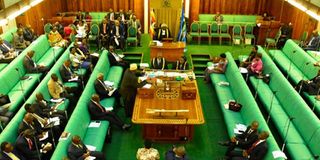Speaker Oulanyah tells MPs to reject bad laws

Parliament during plenary.
What you need to know:
- The Public Order Management Act enacted by the 9th Parliament has been criticized by rights groups and political activists for requiring police authorization for peaceful demonstrations and public meetings.
- Most Ugandan laws are originated by the government on the direction of the Cabinet, although individual MPs with leave of Parliament can initiate a Private Member’s Bill. The Justice Ministry presents a Bill in Parliament to introduce a law initiated by the government.
PARLIAMENT. Some of the government-initiated Bills for Parliament’s consideration are candidates for the trash bin, the Deputy Speaker Jacob Oulanyah has said.
“The fundamental principle is that if the policy is bad, no amount of amendment on the instrument will make it a good policy; so, parliament must reject it out rightly,” he said.
“If something is wrong from the beginning don’t waste Parliament’s time handling it, throw it out immediately, promptly,” he added, without specifying the defective planned legislations.
The Kampala Capital City Authority Bill, 2015, and the Constitution Amendment Bill, 2017, are some of the proposed legislations pending consideration by the House.
Mr Oulanyah wondered why the House spends time to consider outright bad draft pieces of legislation, or encourage the government to revise them, when the right thing is to trash them.
The Deputy Speaker made the comments yesterday while addressing a delegation from the Parliament of Zimbabwe who paid a courtesy call on him at Parliament.
The visiting Finance and Development committee members were led by their chairperson, Ms Melody Dziva, and are in the country to benchmark best practices relating to budgeting and autonomy of the legislature during the process.
Mr Oulanyah said that parliaments must be independent and serve the “will of the people”, contrasting criticism of Uganda’s 10th Parliament by opposition politicians as playing subordinate to the Executive.
All laws and policies, the Deputy Speaker noted, must fall within the realm of constitution provisions and other existing legislations and be enacted to address the vested interests of all citizens, cultural practices and human rights.
“Sometimes these proposals are made in haste and simple mistakes are made, rendering the law totally incapable of implementation,” he said.
The Public Order Management Act enacted by the 9th Parliament has been criticized by rights groups and political activists for requiring police authorization for peaceful demonstrations and public meetings. The law enforcement agency has invoked provisions of the law to prevent activities of Opposition leaders, including legitimate political party programmes.
Mr Oulanyah yesterday said that although Parliament has repeatedly been accused of rubber-stamping decisions of the Executive, in reality MPs properly srutinise all Bills and make progressive amendments, including to budget proposals.
“The Parliament is extremely suspicious of the Executive; so, nothing will just pass…they will look at it properly,” he said.
If the executives were working properly and all the time in the public interest, Mr Oulanyh said, parliaments would have limited role to play in the legislative and budgeting process.
LAW MAKING PROCESS
Most Ugandan laws are originated by the government on the direction of the Cabinet, although individual MPs with leave of Parliament can initiate a Private Member’s Bill. The Justice Ministry presents a Bill in Parliament to introduce a law initiated by the government. Parliament refers such Bills to the relevant committees which scrutinises it and conducts public hearing, before tabling its report for consideration by the whole House. Parliament discusses and enacts the legislation, with appropriate amendments, as an Act of Parliament. It only becomes law after the President has assented to it.




